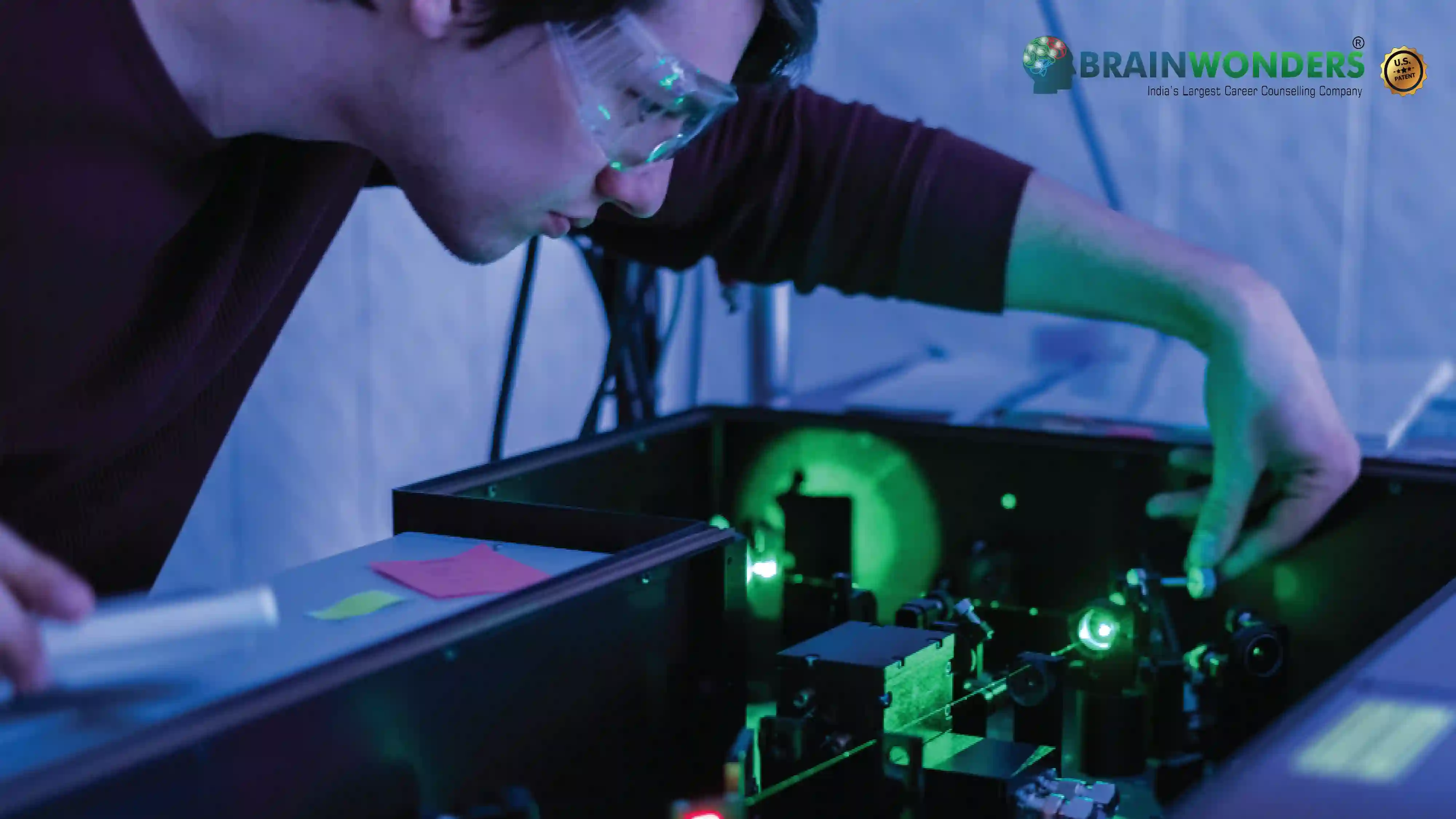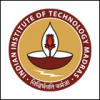How to become a Photonics Engineer
Overview, Courses, Exam, Colleges, Pathways, Salary

Overview
Who is Photonics Engineer ?
A Photonics Engineer is a specialized professional who applies photonics principles – the science and technology of generating, manipulating, and detecting light – to create innovative solutions in various industries. These engineers possess a deep understanding of optics, electronics, and materials science, enabling them to design and develop optical systems and devices that harness the unique properties of light.
Photonics Engineers are crucial in advancing fields such as telecommunications, medical imaging, information technology, and manufacturing. They design and optimize components like lasers, optical fibres, lenses, and detectors to enable high-speed data communication, precise medical diagnostics, and cutting-edge imaging technologies.
These engineers also contribute to emerging areas like quantum optics, where they manipulate individual photons for quantum information processing and secure communication.
Their expertise encompasses both theoretical knowledge and practical skills. They utilize sophisticated software for optical simulations, engage in experimental work to fine-tune device performance and collaborate with multidisciplinary teams to integrate photonics solutions into complex systems.
In a rapidly evolving technological landscape, Photonics Engineers drive innovation, pushing the boundaries of what is possible with light-based technologies. Their work enhances everyday life, facilitates scientific discovery, and underpins critical industries, positioning them at the forefront of modern engineering and research.
Typical day at work
What does Photonics Engineer do?
- Design, examine, and test performances of the Photonic system or operational needs
- Build optical or imaging systems like optical imaging products, optical components, image processes, or signal processing technologies
- Create and test Photonic experimental products, prototypes or models
- Assist in the transition of Photonic prototypes to production
- Review literature, collaborate with colleagues, pursue education, attend conferences to be updated of field developments
- Conduct and draft new Photonics technologies research proposals or reports
- Determine limits, functionality or optimization of Photonics systems/components by testing
- Determine product features by its relevant practical applications
- Design electro-optical sensing or imaging systems
- Document design processes, objectives, issues, or outcomes of Photonics system
- To attain increased energy efficiency, design Photonics products like light sources, displays, or Photo voltaics
- Train and educate other employees
- Examine, fabricate, or test fiber-optic links
- Design light emitting or light sensitive devices such as gas lasers, solid state lasers, infrared, etc.
- Produce and maintain database of Photonic designs
- Supervise manufacturing, assembly, or fabrication process
- Establish electro-optical device’s commercial, industrial, scientific, or other uses
- Build solar energy Photonics or devices for energy generation
- Develop laser machining equipment, laser-processed designs like laser-cut medical devices.
Abilities and Aptitude needed
What are the skills, abilities & aptitude needed to become Photonics Engineer?
- Photonics engineers need ample education on Photonics, its practical applications, and unique challenges. It is necessary to be able to read and comprehend complex technical and scientific literature. They regularly use complex mathematical equations, statistics, and formulas in their work. Along with this, they require a strong computer, software, and programming abilities since work involve designing.
- Since the work includes practical activity, hands-on problems and solutions, they should be comfortable working with materials, tools, and machinery. This requires manual dexterity, precision, eye for detail, accuracy, and careful equipment monitoring. Additionally, they must be adaptable enough to function in a variety of settings. Time management and job prioritisation are critical, but so is a commitment to quality.
- Inquisitive, intelligent, introspective, and investigative are some of their most common personality attributes. They are curious, methodical, scientific, logical, rational, and analytical.
- They should be able to effectively communicate, both verbally and in writing, their research processes and findings. They usually work in or lead teams and must be able to motivate and direct other team members, thus, interpersonal, leadership, and project management skills are necessary.
- They need to have critical thinking and problem-solving skills to find solutions to complex problems and draw conclusions from experimental results through sound reasoning and judgment.
Salary
Salary for Photonics Engineer?
Salary of A Photonics Engineer is s follows :
- Minimum Monthly Salary: An entry-level Photonics Engineer's salary can vary depending on experience, location, and employer. It could range from INR 40,000 to INR 80,000 or more in India.
- Maximum Monthly Salary: Highly experienced and specialized Photonics Engineers, especially those in senior roles, research institutions, or with niche expertise, may earn a monthly salary ranging from INR 1,00,000 to INR 2,50,000 or more.
- Annual Salary: For junior Photonics Engineers, the annual salary might be approximately INR 4.8 lakhs to INR 9.6 lakhs per year. Seasoned professionals in Photonics Engineering may achieve a top yearly salary ranging from INR 12 lakhs to INR 30 lakhs or more.
- Highest-Paying Jobs and Scope: The most lucrative positions for Photonics Engineers are often available in specialized research centres, photonics laboratories, and technology-driven industries. Engineers with expertise in laser systems, optical communication, or photonics integrated circuits might have higher earning potential. The field's scope is promising as Photonics Engineers drive technological innovations in communications, medical imaging, and manufacturing. With a growing need for advanced optics in various industries, including telecommunications and healthcare, the demand for skilled Photonics Engineers is anticipated to rise, offering excellent prospects for career growth and specialization in Photonics Engineering.
Pathways
How to become an Photonics Engineer?
Entrance Exam
Entrance Exam for Photonics Engineer ?
Courses
Which course I can pursue?
Best Colleges
Which are the best colleges to attend to become an Photonics Engineer?
Industries
Which Industries are open for Photonics Engineer?
A Photonics Engineer can find opportunities in various industries that involve applying photonics technology. Photonics is the study and use of photons (light particles) for various purposes, such as communication, imaging, sensing, and more. Here are some industries where a Photonics Engineer can work:
- Telecommunications: Photonics Engineers are crucial in designing and developing optical communication systems, fibre-optic networks, and high-speed data transmission technologies.
- Optical Components and Devices: This includes designing and manufacturing optical components such as lasers, lenses, photodetectors, optical amplifiers, and other devices used in imaging, measurement, and data transmission.
- Biophotonics and Medical Imaging: Photonics technology is widely used in medical imaging, diagnostics, and therapies, including laser surgery, endoscopy, and non-invasive imaging techniques like optical coherence tomography (OCT).
- Defence and Aerospace: Photonics Engineers can work on developing technologies for military applications, including laser-based communication, remote sensing, and directed energy weapons.
- Manufacturing and Material Processing: Laser-based manufacturing processes, such as cutting, welding, engraving, and 3D printing, utilize photonics technology to manipulate materials with high precision.
- Renewable Energy: Photonics plays a role in developing solar cells, photovoltaic systems, and other technologies related to harnessing and converting solar energy.
- Sensing and Imaging: Photonics is crucial in various sensing technologies, including lidar (Light Detection and Ranging) for autonomous vehicles, environmental monitoring, and remote sensing.
- Consumer Electronics: Displays, cameras, and sensors in consumer electronics often use photonics technology, providing opportunities for Photonics Engineers in this industry.
- Research and Development: Many research institutions and universities employ Photonics Engineers to work on cutting-edge technologies, advancing the field through experimentation and innovation.
- Semiconductor Industry: Photonics Engineers can contribute to developing semiconductor devices, integrated circuits, and optoelectronic components.
- Space Industry: Photonics technology is used in space exploration for communication, imaging, and scientific instruments.
- Entertainment and Display Technology: Photonics is used in various entertainment technologies, including laser light shows, projectors, and augmented reality/virtual reality (AR/VR) displays.
- Environmental Monitoring: Photonics-based sensors and systems monitor pollution, greenhouse gases, and other environmental factors.
internship
Are there internships available for Photonics Engineer?
Internship opportunities for Photonics Engineers can be found in various industries and sectors. These internships allow students and recent graduates to gain practical experience, apply their knowledge, and develop skills in photonics-related fields. Here are some specific examples of potential internships available for Photonics Engineers:
- Optical Communications Intern: Worked with a telecommunications company to assist in designing and testing optical communication systems, fibre-optic networks, and high-speed data transmission technologies.
- Laser Systems Intern: Join a company that specializes in laser technology to work on the development, calibration, and testing of laser systems used in manufacturing, medical devices, or research.
- Biophotonics Research Intern: Collaborate with a research institution or medical device company on biophotonics projects, such as developing optical imaging techniques for medical diagnostics or therapies.
- Photonics Product Development Intern: Join a technology company to contribute to the design, prototyping, and testing of photonics-based products, such as optical sensors or imaging devices.
- Optical Design Intern: Worked with an optics company to assist in designing and simulating optical components and systems using software tools like Zemax or Code V.
- Semiconductor Photonics Intern: Join a semiconductor manufacturer to learn about the design and fabrication of optoelectronic devices, such as laser diodes or photodetectors.
- Photonics Manufacturing Intern: Gain experience in the manufacturing process of optical components and systems, including quality control, assembly, and testing.
- Photonics Research Assistant: Assist researchers at a university or institution in conducting experiments, analyzing data, and contributing to photonics-related research projects.
- Environmental Sensing Intern: Collaborate with a company focused on environmental monitoring to develop and test photonics-based sensors for pollution detection or climate research.
- AR/VR Photonics Intern: Work with a company specializing in augmented reality or virtual reality technologies to contribute to developing photonics-based display systems.
- Space Photonics Intern: Join a space agency or aerospace company to assist in designing and testing photonics systems for space exploration, communication, or remote sensing.
- Renewable Energy Photonics Intern: Collaborate with a renewable energy company to work on projects involving photovoltaics, solar energy harvesting, or energy-efficient lighting.
- Entertainment Lighting Intern: Gain experience with a company that provides entertainment lighting solutions, working on projects such as laser light shows or stage lighting systems.
- Photonic Integrated Circuits Intern: Join a company focused on integrated photonics to contribute to designing and testing photonic integrated circuits for communication and sensing applications.
- Photonics Entrepreneurship Intern: If interested in startups and entrepreneurship, consider interning at a photonics-related startup to learn about technology commercialization and business development.
Career outlook
What does the future look like for Photonics Engineer?
Photonics engineers work full time in an office or laboratory environment. They may have to travel for work and overtime might be required to meet deadlines. Photonics engineers work in government organizations like the military for tracking and weapon and missile target navigation. They can find employment in healthcare facilities for creating lasers for the purpose of heart or eye surgeries. Other opportunities are found in telecommunications firms to develop more advanced optical fibre cables for data transmission. They work in manufacturing plants to determine energy-efficient screens of televisions by testing crystals; aligning, drilling, cutting through metal, plastics and other hard surfaces; and designing energy-efficient LED lights for vehicles. The career begins as an assistant to an experienced engineer. After years of experience, they may become supervisors and advance to management positions. One can also become a research director or principle engineer, with needed education.







